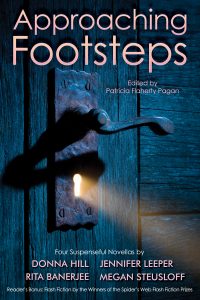
We’re so pleased that author, & scholar Rita Banerjee had time to sit down with us and talk about her writing. The fascinating novella that she contributed to Approaching Footsteps, “A Night with Kali,” has received good reviews from our readers. We can’t wait to share more about her work and her writing process.
*****
Spider Road Press: “A Night with Kali,” is a captivating story. How did the concept for this piece come to you? Or, maybe a better question might be, what inspired you to write about Tamal-da and Didi?
Rita: When I first drafted this novella, I created the story of Tamal-da and Didi in a storm. In a week off between writing chapters of my dissertation on South Asian literary modernisms, I decided to take a break and write something with ferocity. There is something seductive about the idea of the uncanny, the sense of discomfort that appears in suspense novellas, sure, but also that strange tension between two people who meet but never quite see each other fully until it’s too late. Tamal, being a streetwise taxi driver, and his passenger, whom he calls Didi, being a bored out-of-towner obsessed with Marxist poets, makes for an uneasy alliance. They are trapped together in a cab and stranded in the middle of a monsoon hitting Kolkata. To pass the time, they entertain each other with stories. What happens next is uncanny, unbelievable, and strangely seductive.
SRP: I’m on the edge of my seat just from your synopsis…and I’ve already read the story and know what happens. Thank you for spinning such a suspenseful tale with such intriguing protagonists. Where did these characters come from and what made you decide to have two such strong focal characters in your story?
Rita: As a writer, I’m fascinated by stories of the other—of individuals, communities, languages, histories, and cultures—that somehow, more often than not, find themselves wiped clean by the canons of high art and cultural capital. What makes Tamal so fascinating is that he’s not your typical bourgeois narrator. He is not a Bollywood prince, an up-and-coming IT specialist, or part of the Bengali intelligentsia, and yet the story he spins has very little to do with his caste or class, and everything to do with his imagination and his ingenuity.
Didi, on the other hand, is too busy protecting her books and chasing her bourgeois dreams of high art to recognize the singular narrative unfolding in front of her. She’s a person who mis-sees and mis-hears. She is an uneasy stand-in for the audience. And while Tamal seems like an ordinary taxi driver, and Didi something of an aloof princess, when they come together, opposite as they are, a story forms between them that is more vivid and uncanny than anything else that’s been written on the page.
SRP: And we love their dynamic! Thank you for bring them to life in our imaginations. In our opinion, A Night with Kali is a story within a story. Did you find it challenging to write such an intricate tale? And, for our readers that are writers, were there any particular hurdles or revelations about this choice and process that you could share?
Rita: From the Pañcatantra to the Arabian Nights to Mary Shelly’s Frankenstein, I’ve always been interested in stories within stories—with narratives that stop, tunnel, re-start, take you down a rabbit hole and bring you back more alive.
SRP: Let’s take a minute to talk more about Rita than Kali. You are the epitome of a multi-genre writer – poetry, lyrical essays, novels, novellas, reviews, magazine articles. Need I go on? What fuels your choice to have your fingers in so many literary pies rather than focusing solely on one genre or style?
Rita: When I was doing my MFA in Creative Writing in Seattle, one of the things I found jarring were the tracks American writers were expected to follow—you were either a poet in the MFA program, or a fiction writer. David Shields was teaching classes on nonfiction at UW, but to declare yourself to be an essayist or memoirist was like declaring yourself to be a chimera. For me, I’ve always looked up to writers who have crossed and then deliberately smudged the lines behind them. During my MFA years, I had the good fortune to finally study Bengali literature and language with Carol Salomon, and around that time I discovered the not-so-secret life of Rabindranath Tagore. During my MFA, I studied not just his poetry, which I had puzzled through as a teenager, but his plays, his songs, his doodles and artwork inspired by Pacific Northwest Indians, his travelogues, his translations. Tagore, was something of a polymath. He was the first writer from a non-Western nation to win the Nobel Prize in Literature, and his poems became the basis for the national anthems of Bangladesh, Sri Lanka, and India. But what made Tagore fascinating to me was that he dared to experiment with different forms and genres. So did Kālidāsa, Murasaki Shikibu, Goethe, and so many writers before him. These writers, to me, seemed to keep active and alive, by mastering and not being afraid to jump genres.
SRP: Sounds like you benefited from exposure to outstanding authors. Especially Tagore. Thank you for bringing those greats to our immediate attention and sharing your passion for their writing and lives with us. As an educator and supporter of new and emerging writers, what’s your best piece of advice for young writers getting started or not losing steam?
Rita: If writing were like Fight Club, I would say that the first rule of writing is: Write, Write, Write. The second rule of writing is: Read, Read, Read. The third rule: Go back to rule one until you get it right.
SRP: Fantastic advice! We know your calendar is packed. What’re you working on these days—both in writing and in personal ventures?
Rita: I’m actively working on a few book projects—a book on mid-20th century South Asian poetry and theories of the avant-garde, Echo in Four Beats, my second poetry collection on jazz, mythology, and the breakdown of language, and two new creative writing manuscripts which are currently taking over my life. The first is a collection of non-fiction lyric essays, centered on the concepts of race, sex, politics, and cool, and why I’m completely obsessed with interrogating these ideas as a writer, artist, and human navigating the world. The second book I’m currently working on is what seems like a now eerily prescient novel about a girl named Mel Cassin. Mel lives in a near-future America run by a plutocratic totalitarian regime in which arbitrary laws for the non-elite are normative. Mel faces a conundrum—to pursue what has happened to her family, or to continue existing in an authoritarian world.
SRP: Well, we can’t wait for those both to come out. Last question. If you could have coffee or lunch with any writer (from past or present), who would it be and why?
Rita: Great question. I’d love to have a drink or meal with a table of my favorite writers and luminaries. But if I had to choose just one, I might choose Nietzsche. Mostly, because I would like to see his mind work in real-time, and mostly because I’d love to see if I could out debate him. (If we had our conversation in German, though, he might have the upper hand.) But I would love to see what observations he brings to the table—whether on truth or lies, or on metaphors and the import of art, or on the very pillars of human nature and psychology, and how he responds to the realities of the day. The conversation would be intense and full of challenges but perhaps it would be the opposite of deconstructive.
Thank you to Rita for taking the time to share a bit more of herself with us and for writing such a suspenseful story for Approaching Footsteps. For your copy of this new release (including Rita’s story A Night with Kali), visit our online bookstore at www.spiderroadpress.com/book-store/ or pick up your Kindle copy on Amazon. For more information about Rita, you can check out her website – https://ritabanerjee.com/. Thanks for being a supporter of writing for, by and about strong women!


I enjoyed “A Night with Kali,” and am looking forward to reading more of this gifted writer. Also agree with her “Fight Club” writing rules!